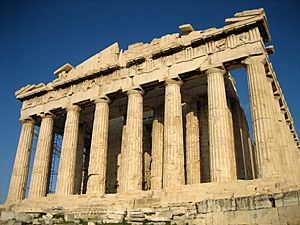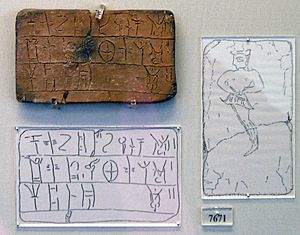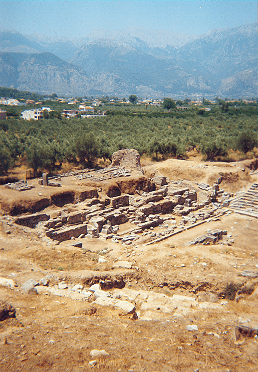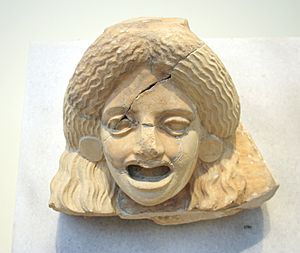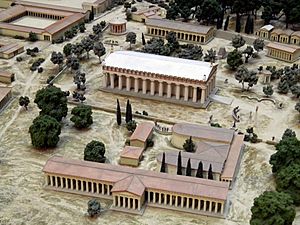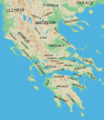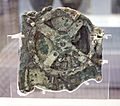Ancient Greece facts for kids
Ancient Greece was a powerful civilization that existed a long time ago. It lasted from about 800 B.C. until 31 B.C., when the Romans took control. Ancient Greece greatly influenced many cultures that came after it. Its ideas shaped how people thought about philosophy, politics, and education.
Historians usually divide the history of Ancient Greece into three main periods:
- The Archaic period started around 800 B.C. This was when the first Olympic Games began. Also, the famous writer Homer wrote his epic stories, the Iliad and the Odyssey, during this time.
- The Classical period began with the Greco-Persian Wars. These were big conflicts when Persia tried to invade Greece. Famous thinkers like Plato, Aristotle, and Socrates lived during this period. The wars between the powerful cities of Sparta and Athens also happened then. This period ended when Alexander the Great of Macedon died. Many people believe Classical Greece laid the groundwork for modern Western culture.
- The Hellenistic period spread Greek culture far and wide. This happened because of Alexander the Great's conquests, reaching from Central Asia to the western Mediterranean Sea. This period ended in Greece when the Roman Empire took over. The Romans admired and adopted many Greek ideas, especially their philosophy.
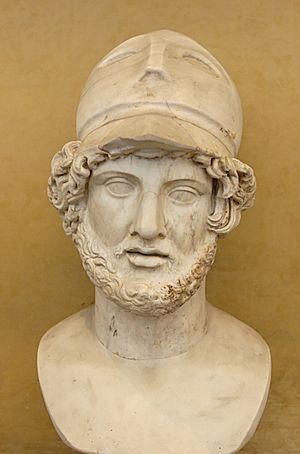
Contents
How Ancient Greeks Learned to Read
After a period called the Dark Ages, the Greeks lost their ability to read and write. But in the 8th century B.C., they learned again. They got the idea for an alphabet from the Phoenicians. The Greeks added their own changes, like special letters for vowel sounds, which were important for their language. Later, the Romans copied the Greek alphabet. This Roman alphabet is what much of the world uses today.
How Greek Cities Were Governed
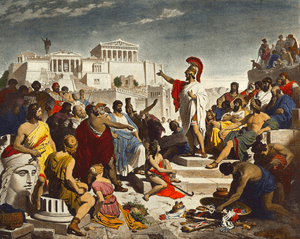
Ancient Greece had one language and culture. However, it was not a single country. It was made up of many independent cities. Greece only became unified in 337 B.C. This happened when Macedon defeated Athens and Thebes. The conquered cities then joined a group called the Corinthian League. They were still allowed to govern themselves.
Life in the City-States
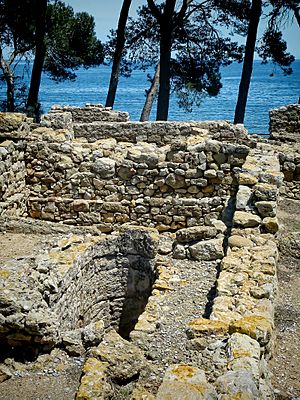
Ancient Greece was made up of hundreds of independent city-states. This was different from other places, which were usually tribes or large kingdoms.
The ancient Greeks knew they were "one people." They shared the same religion, basic culture, and language. But each city-state, or "polis", was independent. Some cities were democracies, where people voted. Others were aristocracies, ruled by a few rich families. Some were monarchies, ruled by kings.
Greece has many hills, mountains, and rivers. These natural features divided the land. City-states grew within these natural borders. One famous Greek kingdom was Macedon. For a short time, it became the largest kingdom in the world. This was because it conquered the Persian Empire, including ancient Egypt, and reached into modern-day India. Other well-known kingdoms were Epirus and Thessaly.
As the Greek civilization grew, they needed more food. So, they started new cities along the coastline. By the 6th century B.C., some cities became very important. These included Corinth, Thebes, Sparta, and Athens.
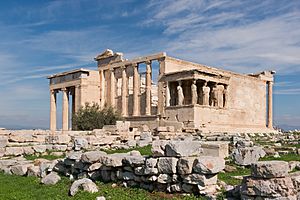
Athens became a democracy in 510 B.C. Men would gather in the city center to decide what to do. They would talk and then vote at the Boule, which was like their parliament. Athens was the first place to govern itself this way. Every year, Athenian citizens elected eight generals to lead them in war.
Daily Life in Ancient Greece
When men were not working, fighting, or discussing politics, they could go to the theater. They watched dramas, comedies, or tragedies during festivals. The plays often talked about politics and the gods of Greek mythology. Men played all the roles in the plays, even the female characters.
Women usually did work at home. This included spinning thread, weaving cloth, cleaning, and cooking. Wealthy families had slaves to do this work for them. Women were not involved in public life or politics.
Ancient Greek Games
The famous Olympic Games were held at Olympia every four years. Sports included running, javelin throwing, discus throwing, and wrestling. Only men could compete in these games. They came from all over Greece.
There was also a competition for women called the Heraean Games. It was held at Olympus at a different time than the men's event. Girls in Sparta had different rules than in other cities. They trained in the same sports as boys. Spartans believed that strong women would have strong babies, who would become great warriors.
Later, in the Classical period, girls could compete in some of the same festivals as males.
Interesting Facts About Ancient Greece
- Mainland Greece is almost completely surrounded by the Mediterranean Sea. It also has about 1,400 islands.
- Greek cities were started around the Black Sea, in North Africa, and near modern-day Spain, Sicily, and France.
- The early city-states mainly relied on agriculture (farming) for their economy, not trade.
- Philip II of Macedon brought the warring Greek city-states together. After he was killed, his son, Alexander the Great, became king and made the empire even bigger.
- Athens and Sparta were two of the most famous city-states, but they were very different. Athens focused on arts and philosophy, while Sparta focused on military training.
- On top of the tallest hill in each city-state, the Greeks built a group of buildings called an acropolis. The acropolis was used for three main things: religious festivals, banks, and a fortress for defense.
- The first Olympic Games were held in Olympus in 776 B.C.
- Greece had many gods and goddesses, known as the Twelve Olympians.
- Greek myths are the stories that remain from the Ancient Greek religion.
- The conquering Romans adopted many ideas from the Greeks.
Related pages
Images for kids
-
Carved busts of four ancient Greek philosophers, on display in the British Museum: from left to right: Socrates, Antisthenes, Chrysippus, and Epicurus
-
The Antikythera mechanism was an analog computer from 150 to 100 B.C. It was designed to calculate the positions of stars and planets.
-
Mount Olympus, believed to be the home of the Twelve Olympians
See also
 In Spanish: Antigua Grecia para niños
In Spanish: Antigua Grecia para niños
 | Delilah Pierce |
 | Gordon Parks |
 | Augusta Savage |
 | Charles Ethan Porter |


